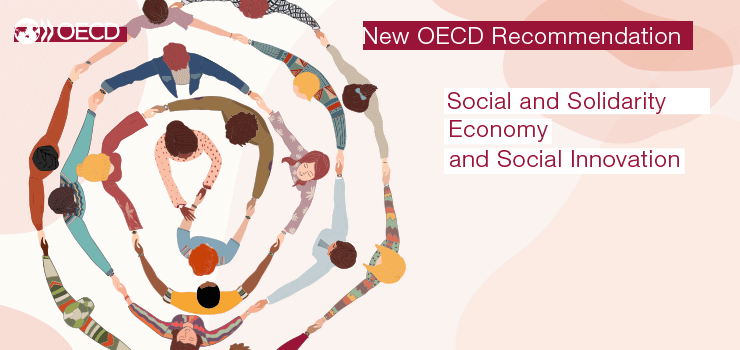OECD Council of Ministers approves Recommendation on Social Economy and Social Innovation
7 July 2022
In June 2022, the OECD Council of Ministers approved the Recommendation on Social Economy and Social Innovation, as the first international standard in this area.
On June 10, 2022, the OECD came up with the first internationally agreed policy framework on social and solidarity economy and social innovation, as a recommendation was approved by the Council of Ministers. As per the generally accepted practice, the definition of social economy endorsed by the OECD includes associations, cooperatives, foundations, mutual societies and social enterprises.
The full text of Recommendation is available here:
The OECD’s Recommendation recognizes the diversity of social and solidarity economy practices and frameworks around the world, but also highlights the features which are shared across contexts, such as:
- Social economy’s contribution to economic growth, fair green and digital transition, inclusive societies and strong local communities;
- Its role in addressing informal employment, supporting the work integration of disadvantaged groups, engaging youth and promoting gender equality;
- Its contribution to economic and social resilience;
- Social economy’s role in addressing societal needs and partnering with other stakeholders, including public authorities, academia, citizens, civil society and business community;
- And the fact that the social economy is a driver of social innovation.
The document calls on the OECD Members and other states adhering to this Recommendation to “develop and adopt a social economy framework that is supported at all levels of government with a view to scale the impact of their social economy for the benefit of all.” It includes a range of important specific recommendations, listed under 9 categories:
- Foster a social economy culture
- Create supportive institutional frameworks
- Design enabling legal and regulatory frameworks
- Support access to finance and funding
- Enable access to public and private markets
- Strengthen skills and business development support within the social economy
- Encourage impact measurement and monitoring
- Support the production of data
- Encourage social innovation
Some of the key points raised by the OECD include: designing better legal frameworks for social economy organisations and addressing the areas where existing legal frameworks disadvantage social economy organisations, compared to other types of economic actors; pursuing a comprehensive public funding strategy for the social economy; improving social economy’s access to finance; facilitating access of social economy organisations to public procurement opportunities; and promoting data collection on social economy. CICOPA recognizes the recommendations as important for the development of the cooperative movement and hopes for their speedy implementation.
To support the further work related to the Recommendation, the OECD will develop an implementation toolkit. More information on OECD’s work on social economy.
You may also find interesting the recent OECD’s paper on “Legal frameworks for the social and solidarity economy”, which among others discusses the diversity of cooperative-related legislation. The paper is available here.

